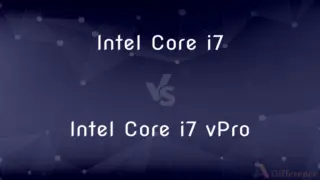Analog Computers vs. Digital Computers — What's the Difference?
By Tayyaba Rehman — Published on December 19, 2023
Analog computers represent data as continuous physical quantities, while digital computers use binary code and operate on discrete values.

Difference Between Analog Computers and Digital Computers
Table of Contents
ADVERTISEMENT
Key Differences
Analog computers are designed to manipulate continuous data or physical quantities. These computers use continuously variable signals, which could be voltages, resistance, or other physical properties to represent data. Digital computers, on the other hand, operate on data that's represented digitally in a binary format, using sequences of 0s and 1s. This makes digital computers adept at precise computations, making them the dominant computing type in today's world.
Analog computers are usually specific in their function, tailored to solve particular types of problems, such as differential equations in real-time. In contrast, digital computers are more versatile and can perform a vast range of tasks given the appropriate software.
While analog computers can be faster for specific tasks because they perform computations in parallel, digital computers benefit from scalability and can handle complex tasks with greater accuracy due to their binary nature. Today, most computing tasks are managed by digital computers, given their flexibility and accuracy, while analog computers are more niche, primarily used for specific applications where their unique characteristics shine.
Comparison Chart
Data Representation
Continuous physical quantities
Binary code (0s and 1s)
Precision
Subject to inaccuracies
High precision due to discrete values
ADVERTISEMENT
Flexibility
Task-specific
Versatile with appropriate software
Computational Method
Parallel computations
Sequential computations
Usage
Niche, specific applications
Broad range of applications
Compare with Definitions
Analog Computers
Can be faster but less precise for some applications.
For certain real-time simulations, analog computers offer unparalleled speed.
Digital Computers
Devices that operate using binary data representation.
Modern laptops and desktops are examples of digital computers.
Analog Computers
Primarily used in applications demanding real-time solutions.
Some specialized scientific instruments still use analog computers for immediate data processing.
Digital Computers
Typically work through sequential computations.
Central Processing Units (CPUs) in digital computers execute commands one after the other.
Analog Computers
Machines that manipulate continuous data representations.
The slide rule is one of the earliest forms of analog computers.
Digital Computers
Known for high precision due to their binary nature.
Financial calculations are best done on digital computers for accuracy.
Analog Computers
Utilize physical quantities like voltage or resistance.
Early flight simulators relied on analog computers to replicate real-time conditions.
Digital Computers
Can handle a diverse range of tasks with appropriate software.
From graphic design to software development, digital computers serve myriad purposes.
Analog Computers
Excel in parallel computations for specific tasks.
Analog computers were once crucial for real-time differential equation solutions.
Digital Computers
Dominate the modern computing landscape.
Smartphones, an essential part of our lives, are essentially compact digital computers.
Common Curiosities
Which is more versatile: analog or digital computers?
Digital computers are more versatile, able to perform a vast range of tasks with the right software.
Are analog computers still in use today?
Yes, while less common, analog computers are used in niche applications requiring real-time solutions.
Can analog computers handle tasks like word processing or internet browsing?
No, such tasks are best suited for digital computers due to their versatility and binary nature.
What's the primary data representation in analog computers?
Analog computers use continuous physical quantities for data representation.
Why might one choose an analog computer over a digital one?
Analog computers can be faster for specific real-time applications, offering parallel computations.
How do digital computers represent data?
Digital computers represent data using binary code, consisting of 0s and 1s.
What's an example of an early analog computer?
The slide rule is a simple example of an early analog computer.
Is it possible to combine analog and digital computing methods?
Hybrid systems that utilize both analog and digital computing methods have been explored, especially in specialized applications.
How do digital computers achieve accuracy?
Digital computers achieve high accuracy due to their binary data representation and discrete value operations.
Can digital computers simulate analog processes?
Yes, with appropriate software, digital computers can simulate analog processes, though there might be some limitations.
Are smartphones considered analog or digital devices?
Smartphones are digital computers.
Which computer type would be best for real-time simulations?
Depending on the specifics, analog computers might offer advantages for certain real-time simulations due to their parallel computational capabilities.
Why have digital computers become more popular?
Digital computers offer high precision, scalability, and versatility, making them suitable for a broad range of applications.
Do analog computers have a CPU?
No, the concept of a CPU is specific to digital computers.
Are modern PCs and laptops digital computers?
Yes, modern PCs and laptops are examples of digital computers.
Share Your Discovery

Previous Comparison
Tasks vs. Duties
Next Comparison
Votre vs. VosAuthor Spotlight
Written by
Tayyaba RehmanTayyaba Rehman is a distinguished writer, currently serving as a primary contributor to askdifference.com. As a researcher in semantics and etymology, Tayyaba's passion for the complexity of languages and their distinctions has found a perfect home on the platform. Tayyaba delves into the intricacies of language, distinguishing between commonly confused words and phrases, thereby providing clarity for readers worldwide.
















































